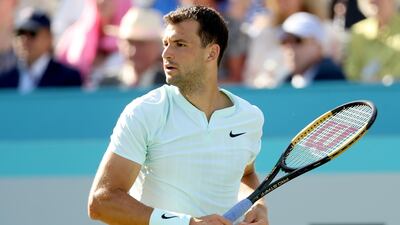He was billed as the next transcendent star of men’s tennis. Even his nickname alluded to as much. In the early years of a career full of promise and limitless potential, Grigor Dimitrov earned the moniker “Baby Fed” for his similarities to Roger Federer – the elegant shot-making, the effortless swagger, the technically flawless one-handed backhand. Even his serve mimicked the Swiss great.
While the name was founded in stylistic comparisons, the Bulgarian was also widely expected to fill the eventual void left by the superstar player nine years his senior. It certainly seemed to be trending in that direction.
In January 2014 and at the age of 22, Dimitrov cracked the top-20 of the world rankings. It proved the start of a season that would encompass three titles, a rise to No 8 and his first appearance in a grand slam semi-final at Wimbledon, where he decimated defending champion Andy Murray a round earlier.
Then it all started to go wrong. Dimitrov experienced an alarming slump throughout 2015 and the first half of 2016. His ranking dropped to No 37 and after a fifth successive first round defeat – the last of which came at Queen’s where two years earlier he was champion – Dimitrov admitted he was battling for belief.
“I’ve lost a lot of confidence in myself,” he admitted. “I’ve been there before but this time it’s just kind of different. It’s just really scary. What scares me is that I’m really not finding a way, and usually I’m pretty good at bouncing back. A lot of losses have always motivated me – just right now it’s not happening.” It was a damning self-assessment of his struggles.
Dimitrov soon regrouped, though, and after finishing 2016 with a modicum of form, the Bulgarian embarked on the best campaign of his career. In 2017, he was two points from reaching the Australian Open final, won four titles – including the biggest of his career at the season-ending ATP Finals – and reached a personal best No 3 in the world rankings.
The “scary” loss of confidence seemingly overcome, Dimitrov was finally nestled in among the ATP Tour’s elite. It appeared as though the only way was up for this super-talented athlete.
That was, until it started to unravel again. A mixed 2018 has given way for this current season that eclipses the slump of 2015. It hit a nadir on Tuesday when, at the Atlanta Open, Dimitrov lost to the world No 405 Kevin King 7-5, 6-4 in the first round.
King, who had never won an ATP Tour match, came from losing positions in both sets, won six games in a row at one point, and earned a staggering 23 break points on the Dimitrov serve. This was not just a player having a bad day, but one completely shot of confidence.
It should be noted that Dimitrov’s former coach, Peter McNamara, died the day before, so that could well have been playing on his mind. Yet, even in these tragic circumstances, it is difficult to disguise the fact that a player blessed with such abundant talent has spent half of his career in slumps or recovering from them.
There is certainly nothing wrong with his skillset. Dimitrov is capable of producing the sort of magic reserved for the very few. What he evidently lacks is the mental solidity to compliment his talent, the ruthlessness that all serial winners possess. A case in point: Dimitrov led world No 84 Corentin Moutet by two sets and a break in the first round of Wimbledon last month. He proceeded to lose in five sets.
When Dimitrov is riding a wave, he can be close to unstoppable, but when he falters it becomes a slippery slide he struggles to arrest.
So where does he go from here? On the surface it looks like he has two options: either play on, keep grinding and hope his form turns - after all, it worked the last time - or take some leave, refresh and reset.
Considering his current spiral, the second option could be quite appealing. It would allow Dimitrov, now ranked No 53, to remove himself from the situation that is causing his slump and provide the space for reflection and reassessment. A few months off to recharge can work wonders for tennis players given the uncompromising rigours of the ATP Tour circuit.
At 28, Dimitrov still has time to achieve a lot more in the game. Whether his confidence issues prevent him from doing so will remain to be seen.

